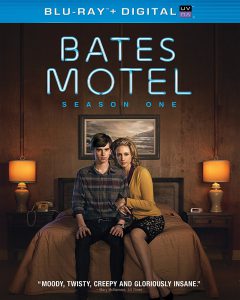I’ve never been high on the idea of reboots, but “Bates Motel” (9 p.m. Central Mondays on A&E) makes a strong case that they shouldn’t be dismissed out of hand. This reboot/prequel to the “Psycho” franchise takes place in present day and therefore won’t necessarily match up with the events of the 1960 Hitchcock classic, yet I can see why executive producer Carlton Cuse (“Lost”) is tapping into the Norman Bates mythology.
New story, but our previous knowledge adds to the fun
While “Bates Motel” doesn’t strictly relate to any of the previous four movies, three books or one TV pilot (also called “Bates Motel,” back in 1987 for NBC), a viewer’s knowledge of the character seeps into every scene.
From his initial portrayal by Anthony Perkins, Norman Bates has been unambiguously psychotic. Almost all of the saga’s spinoff material has sought to answer how he turned out that way, as if each subsequent entry was a character analysis more so than a sequel. “Bates Motel” might end up doing the best job of any of them.

“Bates Motel” Season 1 (2013)
Mondays, A&E
Creators: Anthony Cipriano, Carlton Cuse, Kerry Ehrin
Stars: Vera Farmiga, Freddie Highmore, Max Thieriot
Played by Freddie Highmore, Norman is a quiet, introspective — but mostly normal — 17-year-old. Still, we can see why he might turn out not-quite-right in the head. For one thing, consider the small California town that he and his (notably young and attractive) mother, Norma (Vera Farmiga), move to: It’s jam-packed with attractive young women who take an immediate liking to Norman.
Four cute girls tell him it’s cool that his mom bought the old motel, give him a ride to school and invite him to a party. Another cute girl at the party tells him she likes quiet types (the scene could be straight out of “The Perks of Being a Wallflower,” seeing as how Highmore looks exactly like Logan Lerman).
Norman’s super-hot language arts teacher tells him she’ll be there if he needs anything and encourages him to try out for the track team. Even the girl with cystic fibrosis and an oxygen tank — a fellow wallflower who could become Norman’s friend — is unrealistically good looking.
Not a terrible lot in life
Seen from a long lens, Norman doesn’t have a terrible lot in life. But as a teenager with hormones, it’s gotta wreak havoc with his brain when every woman he encounters is also clearly a sexual object. I know most Hollywood actresses are going to be good-looking regardless of the show’s intent, but it’s purposeful in “Bates Motel.”
Compounding Norman’s confusion, Norma — although Farmiga plays things nicely close to the vest — is clearly jealous of all of these other women in her son’s life. Oh, and then Norman finds a booklet of sexualized drawings underneath the carpet in one of the motel rooms.

“Bates Motel” gets the blend of weird, creepy, mesmerizing, off-kilter tones exactly right; the chemistry between Highmore and Farmiga certainly helps. The most similar show on TV at the moment is “American Horror Story,” and this show is vastly superior. Whereas “AHS” bluntly throws its weirdness in your face, not allowing you time to absorb it, “Bates Motel” is more leisurely and, indeed, Hitchcockian.
It has its share of horror and dark comedy: The pilot episode features a rape scene, a violent borderline-self-defense killing and a tense sequence where the cops (one of whom is “Lost” veteran Nestor Carbonell) almost discover the corpse in the bathtub.
Big shoes to fill
But ultimately, it’s about Norman and the way he can’t reconcile the women in his life, and their various (real or perceived) demands on him, with his complex feelings. Few other shows are able to pull off such a delicate portrayal; indeed, “American Horror Story” wouldn’t know where to begin if tasked with such a thing.
I haven’t totally bought into the Highmore hype, but I suspect he could end up doing some amazing acting as the series — which will add Norman’s older brother to the mix next week — moves forward. If it cribs from “Psycho IV: The Beginning” (1990), which told of Norman’s early life through flashbacks, I can’t complain too much because I don’t remember the details of that film (although I recall liking it). If it does something entirely different, that might be cool too; I don’t expect this to be a faithful retelling of that prequel.
As much as the DNA of the four “Psycho” films informs Norman Bates’ character, so does the modern setting — and every ringing of a smartphone reminds us that “Bates Motel” can end up being something new, exciting and unexpected.

